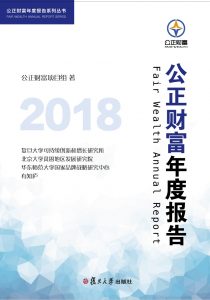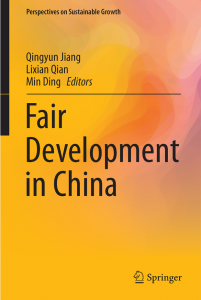Fair Wealth Annual Report 2019(in progress)
Fair Wealth Project Group Springer
2019公正财富年度报告
公正财富项目组 著 复旦大学出版社 预计2020年2月出版

2018公正财富年度报告
公正财富项目组 著 复旦大学出版社 2019年
Growth that is fair, as well as sustainable, is the pillar of development. This is the vision at the heart of our priorities for 2018.
公正和可持续的增长是发展的支柱。这是我们2018年优先事项的核心愿景。
—— 《OVERVIEW OF ARGENTINA’S G20 PRESIDENCY 2018》
2018年11月30日,二十国集团领导人第十三次峰会在阿根廷布宜诺斯艾利斯举行。本次峰会的主题是“Building Consensus For Fair And Sustainable Development”,这是首次在最高级别的全球性会议中,正式将公正(Fair)与可持续(Sustainable)并列作为人类社会发展的核心议题。
公正财富项目组由复旦大学可持续创新和增长研究所、北京大学贫困地区发展研究院、华东师范大学国家品牌战略研究中心与有知庐共同组成,是公正发展(Fair Development)这一理念的长期推动者。自2015年起,项目组聚焦于公正发展理论在商业领域的运用,提出公正财富这一理论,并围绕该理论持续地运作了公正财富评级、非上市企业公正财富评估等多个项目,以此推动公正财富理念。
《2018公正财富年度报告》聚焦于公正财富这一理念,详细阐述该理念的理论基础、基于该理念的评估体系、2018年中国上市企业的公正财富表现情况、评级结果,以及近年来该项目的其他进展。此外,本书也在公正财富的基础上,介绍了公正发展理念及其框架。

Fair Development in China
Jiang, Qingyun, Qian, Lixian, Ding, Min,eds.Springer, 2017
The purpose of this volume is to explore sustainable innovation and “fair development” in China. It examines various existing problems currently faced in China such as food safety, education, healthcare, employment, housing, the environment and censorship, among other, and provides different perspectives in relation to fair development. Topics covered include coordinated governance, energy consumption and policy, dynamic sustainability, green marketing, and people-oriented education. While the focus of the volume is on China, the research process and structure presented can also be used to explore fair development in other emerging economies. Fair development is a framework that includes such principles as sustainability, with particular respect to the implications for human development in the context of available opportunities, resources and outputs. China, the world’s second largest economy, continues to face several challenges when pursuing sustainable development, such as unbalanced growth pressure in the central and western regions and rural areas of China, the fragility of the natural environment, resource constraints and structural problems in economic and social development. It is a crucial mission for China to sustain economic growth without sacrificing environmental sustainability or human rights. For example, there is increasing pressure on China to reduce its dependence on fossil energy. Therefore, innovations in technologies, management and even systems are critical to drive a transition to low-carbon energy, which will be a long term process. Featuring contributions from a diverse group of researcher from multiple disciplines, this volume provides a comprehensive collection of perspectives on economic, political and social development in China.
